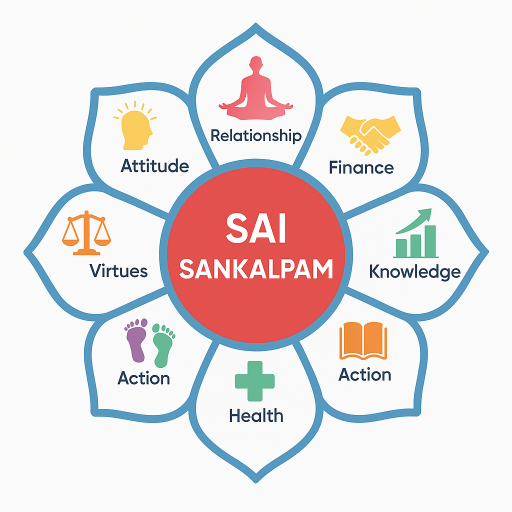Living a Life of Harmony and Purpose through Sathya Sai Baba’s Spiritual Principles
In today’s fast-paced, ever-changing world, the teachings of Sathya Sai Baba provide a beacon of guidance for those seeking a life of harmony and inner peace. At the heart of his teachings are five core spiritual principles: Truth, Right Conduct, Peace, Love, and Non-Violence. Living by these values can transform our daily lives, bringing serenity and purpose.

Truth: The Foundation of Integrity
Truth stands as the cornerstone of Sathya Sai Baba’s philosophy. It involves honesty with oneself and others, fostering authenticity and transparency. Imagine a life where our words reflect our true intentions—such honesty nurtures trust in our relationships. A vivid story is the life of Mohandas K. Gandhi, who epitomized truth in his quest for India’s freedom. His unwavering commitment to truth emboldened a nation to stand together with integrity.
In practice, begin by reflecting on your daily thoughts and actions. Are they aligned with your true self and moral values? Journaling can help. Write down your thoughts at the end of each day and assess their alignment with truth. Strive to be truthful in your interactions, even when it’s challenging.
Right Conduct: Guiding Actions with Morality
Right Conduct, or Dharma, is about righteous behavior and making choices that benefit both oneself and society. It encourages living in harmony with others and our environment, fostering justice and morality. Consider a simple act of kindness like helping a neighbor. These actions, though small, create ripples of positive energy in our communities.
To live by Right Conduct, establish a set of personal ethics that align with these values. Practically, this can involve volunteering, participating in community service, or simply offering help to those in need.
Peace: Cultivating Inner Tranquility
Peace is the tranquil state of the mind, a satin-smooth calmness that emerges when our desires and anxieties subside. It’s about finding contentment within, regardless of external conditions. Take the example of Buddha, who demonstrated that true peace arises from within, independent of worldly pleasures.
To practice peace, incorporate mindfulness into your routine. Begin each day with a few minutes of meditation or deep breathing to create a calm mind. Over time, these moments can cultivate a profound inner peace that precludes stress and anxiety.
Love: The Universal Connection
Love, according to Sai Baba, is the selfless affection that binds all beings. It’s about seeing the divine presence in everyone and treating each other with compassion and empathy. Mother Teresa, with her love for the impoverished, displayed how love transcends barriers, transforming lives and connecting humanity.
Practice love by expressing gratitude and appreciation regularly. Acknowledge the efforts of family, friends, and colleagues, and offer assistance without expectation. Engaging in acts of love enriches our spirit and nurtures a sense of unity with the world.
Non-Violence: Embracing Unity and Compassion
Non-Violence, or Ahimsa, extends beyond physical actions to include words and thoughts, promoting harmony and understanding. A historical illustration is Martin Luther King Jr., whose non-violent approach inspired change and equality. His legacy reminds us that true strength lies in compassion and understanding.
Employ non-violence by practicing empathy. Before reacting in anger, pause to consider the perspective of others. This pause allows for conscious, kind responses rather than reactive ones, fostering peaceful interactions.
Spiritual Practices for Transformation
To integrate these spiritual principles into your life, consider these three actionable practices:
-
Daily Reflection and Meditation: Spend five to ten minutes each day in quiet reflection. Focus on your breathing and let your thoughts pass like clouds. This practice helps cultivate inner peace and clarity.
-
Gratitude Journal: Begin each day by writing three things you’re grateful for. This practice shifts your focus toward positivity and love, fostering an attitude of kindness and appreciation.
-
Acts of Kindness: Commit to performing one kind deed daily, whether it’s helping someone in need or offering a simple compliment. These actions integrate Right Conduct, Love, and Non-Violence into your life.
Incorporating Sathya Sai Baba’s principles of Truth, Right Conduct, Peace, Love, and Non-Violence into our daily lives not only elevates our existence but resonates within the fabric of society, creating a harmonious world for all. Through these teachings, we can embark on a transformative spiritual journey towards inner peace and universal connection.
🙏 Support SaiSankalpam
If this content has helped or inspired you, you may offer a voluntary contribution.
⚠️ Disclaimer:
This is a voluntary contribution. No goods or services are sold.
Payments are processed securely by your UPI app.
SaiSankalpam does not store or access your payment information.

